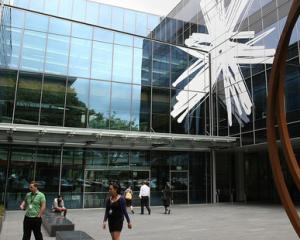Dr Reynolds appears to have achieved the job he was brought to New Zealand in 2007 to complete: the structural separation of the country's then largest company.
By Christmas, it is expected Telecom will be split into two listed companies. Telecom will be a sales and retail company and Chorus will be an infrastructure company.
Neither of those companies looks big enough for Dr Reynolds to remain in a chief executive role, and he could be contemplating life after New Zealand.
The split into two companies was necessary for the company to win the majority of the Government's $1.5 billion ultrafast broadband contracts.
However, Dr Reynolds told the Otago Daily Times from Auckland he was keen to stay on and it appeared he would most likely continue to lead the new retail and sales Telecom.
"The job of getting this done was extraordinarily complex.
The job of setting up two successful businesses is huge. The job of making a large retail service provider work efficiently is a huge challenge.
"The Telecom business has a $5 billion turnover today and will still have a $5 billion turnover the day after the demerger. We just won't have the network."
Telecom was on Tuesday awarded the contract to build and operate all the remaining UFB areas, except for Christchurch and Rangiora, through a structurally separated Chorus in which the Crown will invest nearly $1 billion.
"I am doing the most interesting job in New Zealand and am committed to staying and driving the changes.
"I won't be in this job forever, but I love New Zealand, I love the job and I am in the middle of something big. I haven't spent one second or one minute talking to the board about changing jobs," Dr Reynolds said.
Dr Reynolds came to New Zealand in 2007, the start of a difficult time for Telecom. He arrived in the country and flew straight to Dunedin for the company's annual meeting.
Dr Reynolds, who oversaw the split of British Telecom into separate operating units, pledged to work hard to make sure Telecom earned the right to get their business. When contacted, Craigs Investment Partners broker Chris Timms had high praise for Dr Reynolds.
"He was brought in to do this job. British Telecom had been through a similar process with the United Kingdom government.
"This could be a natural time for Dr Reynolds to move on."
Dr Reynolds had done much to improve the profile of Telecom within the investment community, Mr Timms said. Although the company still had its knockers, Telecom had become a much more open company than in the past.
"He also had no trouble putting up his hand and taking ownership of a problem. There was a history in the past of passing the blame on in Telecom. During the integration of XT, Dr Reynolds put his hand up admitted a mistake and said, `We will fix it.' That is quite refreshing."
Dr Reynolds' Scottish accent, and his size (1.97m) might have helped, Mr Timms said.
Forsyth Barr broker Peter Young said Dr Reynolds was appointed to Telecom when the company was in disarray, having fallen foul of the Labour government and been hit with a heavy regulatory and capital expenditure burden, including operational separation and a mandated fibre-to-the-node roll-out.
"He managed to turn the government relationship around, meet the extraordinarily onerous requirements which had been imposed, and turn around Telecom morale which was then rock bottom."
Dr Reynolds had done a good job in an incredibly difficult environment, mainly of the making of successive governments, Mr Young said.
In the last four or five years, Telecom had probably faced the most difficult environment of any global telecommunications company, ever.



